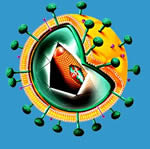September 27, 2009 | Health Matters
New hope for HIV vaccine
 The slightest glimmer of hope for an HIV vaccine emerged this week with the announcement of the results of a trial in Thailand. Out of 16,400 test subjects, half of whom were getting a placebo and the others the vaccine, 23 fewer people got infected among the inoculated group. That difference in infected participants - 51 among 8,200 vaccinated volunteers and 74 among 8,200 people on placebo - explains the vaccine's 31-per-cent efficiency rate.
The slightest glimmer of hope for an HIV vaccine emerged this week with the announcement of the results of a trial in Thailand. Out of 16,400 test subjects, half of whom were getting a placebo and the others the vaccine, 23 fewer people got infected among the inoculated group. That difference in infected participants - 51 among 8,200 vaccinated volunteers and 74 among 8,200 people on placebo - explains the vaccine's 31-per-cent efficiency rate.
The $105-million trial was sponsored by the U.S. Army and administered by the Thai Ministry of Public Health.
Researchers don't fully understand the reasons for this latest vaccine's success; previous vaccine trials have yielded disappointing results. The test combined two of these failed vaccines. ALVAC-HIV uses a bird pox virus to deliver portions of the HIV envelope to induce the body to form antibodies. AIDSVAX replicates the spiky protein appendages found on the outer shell of HIV, to stimulate the immune system into attack mode.
One mystery is that vaccinated volunteers who still became infected ended up with the same amount of virus as those who hadn't been inoculated. Normally, vaccines lower a person's viral load.
Researchers and public health officials are cautious about the results, emphasizing that it will be many years before any vaccine is made available to the public. It would be highly unlikely that any vaccine would have a 100% efficiency rate, meaning that it would only reduce the risk of contracting HIV and would not obviate the need to use condoms.
For first time AIDS vaccine shows some success [New York Times]
Site Reviews
93 Bel Ami Online [visit]91 Corbin Fisher [visit]
89 ASGmax [visit]
88 Cocky Boys [visit]
88 Freshmen [visit]
88 Lucas Entertainment [visit]
88 Blake Mason [visit]
87 Chaos Men [visit]
87 Tim Tales [visit]
86 Broke Straight Boys [visit]
86 Fisting Inferno [visit]
85 Falcon / Hot House Studios [visit]
85 Next Door Studios [visit]
85 Bait Buddies [visit]
85 Boynapped [visit]
Top | Home | About Us | Contact Us | Reviews | Galleries | News | What's Up?
BananaGuide: the gay man's guide to porn
© 2000, 2024 Untangled Web Inc.
